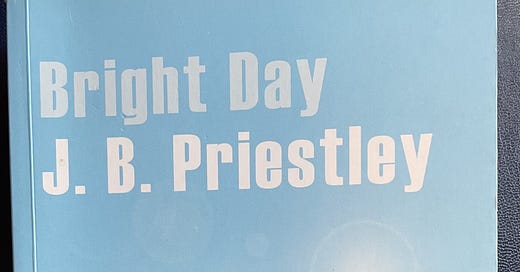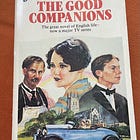This is the third JB Priestley novel I’ve read; the second this year. It was first published in 1946 and was supposed to be Priestley’s own favourite.
Gregory Dawson, a jaded fifty-year-old Hollywood screenwriter, is holed up in a Cornish hotel trying to finish a script. A chance meeting triggers an avalanche of memories from before the first world war when he was in his late teens and living in Bruddersford, working in the wool trade. Bruddersford is the fictional West Riding town that one of the main characters in The Good Companions is from, and it felt familiar to me as we followed Dawson up the Wabley road to home. As in The Good Companions, some of the Bruddersford characters have their accent spelt-out but it isn’t as full-on as in the earlier book.
Incidentally if you want to know what I thought of The Good Companions, you can read my review from a few months ago:
I started reading Bright Day a couple of days after my mother died and the tone of fond melancholy, particularly strong in the first few chapters, suited my mood. We had all been looking back and wondering where the time went, talking about places my mother had worked in the sixties or seventies that had closed down, the buildings either demolished or converted into flats. Dawson is of course looking back at what he now knows to have been the end of a golden, carefree era before his time in the trenches. Hindsight lends poignancy as he mentions in passing that this was the last time he saw that person, or that he’d heard in 1918 that all of this group had been killed.
Structurally, the novel passes neatly back and forth from the ‘now’ of the mid-1940s to the ‘then’ of 1912-14 as Greg struggles with his present dissatisfaction and in his quiet moments tries his best to remember this golden period of his youth, and what it is about that time that’s so important to him. There is a sense of building towards a tragedy that happened in his past but it’s not clear whether it’s a specific personal event or the wider tragedy of the shattering of lives, communities and society that the First World War brought. And of course Greg Dawson has only just come through the Second World War at this point, heightening his sense of loss and waste and pointlessness.
He’s looking for what would these days be called authenticity, and the phony Hollywood aesthetic is grating on him. The day I finished reading Bright Day I happened to read a couple of different things about late stage capitalism, and the way TV and film has a hand in encouraging envy, competition, and unnecessary consumption by always portraying a particular type of ‘desirable’ lifestyle — I felt like Greg Dawson would really have appreciated them.
The novel also neatly sums up my own feelings on private equity, when an experienced wool man complains of the new men coming into the trade to make a quick profit before moving on to liver-pills or motor-cars, instead of understanding the trade and its customers’ requirements: ‘these smart chaps who know nowt but ‘ow to make money fast, they ‘ave no customers, they’re ‘ere today an’ gone tomorrow, and only thing they’ve a respect for is money…they’re no good to themselves nor nobody else.’
The other big theme of the book is the contrast between youth and middle age. How events loom larger and feel much darker (or brighter) when you’re young and inexperienced. How people become symbols and therefore assume more importance than they themselves warrant. And of course how looking back with the benefit of both life experience and hindsight gives a different perspective and can lead to reinterpretation.
It could have been a sad or depressing novel but there’s enough appreciation of the full and interesting life Dawson had in Edwardian Bruddersford, and enough hope at the end, to make it instead feel more of a balance, like real life. The transitions of time and place are deftly done, and as with The Good Companions there are a bunch of great (often amusing) character sketches to set the scene, as well as some lovely descriptions of landscape. When I turned the final page I felt like I’d just watched an excellent British black and white film — something like Cottage To Let or The Blue Lamp, with just the right blend of warmth, humour and grit. So if that’s your kind of thing, I recommend giving Bright Day a go.






This is an absolutely beautiful review. It’s interesting that he sees his youth as a golden age when it is two years before WW1 and is set at the end of WW2. Do these events feature novel? As a child (in the 90s) the to was my babysitter, so I spent a lot of time watching black & white British movies on BBC2, so will have to add this to my reading list for 2025. Thanks so much for the recommendation. 🙏
Lovely review. Glad you liked Bright Day, it's my favourite Priestley too.